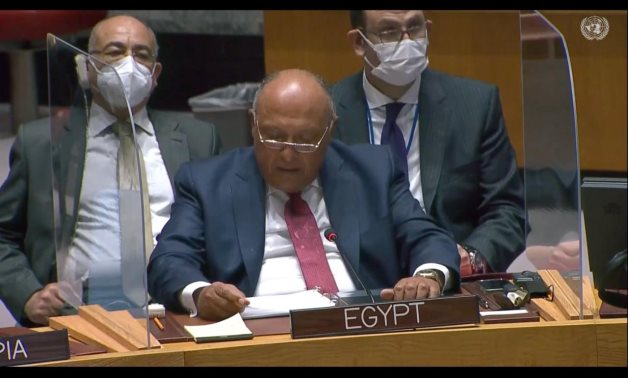
Egypt's Foreign Minister Sameh Shoukry speaks at a session for the United Nations Security Council (UNSC), 8 July 2021 – Egyptian Foreign Ministry
CAIRO – 8 July 2021: Egypt's Foreign Minister Sameh Shoukry warned against the negative impact of the Grand Ethiopian Renaissance Dam in case of a lack of an agreement with Sudan and Ethiopia, saying Egypt “will protect its right in life” in case its “existence is jeopardized”.
During a session for the United Nations Security Council (UNSC) on Thursday, Shoukry said the Ethiopian dam represents an existential threat to Egypt.
He noted that the Egyptian scientific research confirms that GERD can cause significant damage to Egypt and despite Egyptian efforts to preserve water and reuse it, the harm will spread as a plague among the Egyptian people.
In the absence of a binding deal on GERD, this project may lead to a cumulative shortage of water in Egypt estimated at 110 billion cubic meters, Shoukry said.
This shortage will reduce the chance of obtaining clean drinking water, deprive millions of workers at the agricultural sector from the required water for their lands and destroy thousands of feddans of arable lands, the top Egyptian diplomat said.
The minister affirmed that Egypt will not accept or tolerate the negative impact of GERD.
In case the Egyptian water rights are harmed or its existence is jeopardized, Egypt's only option will be to protect its right in life, Shoukry said.
Shoukry said Ethiopia, only few days after the UNSC session on GERD last year, started without considering the laws and norms the unilateral filling of the dam and announced arrogantly that "the river became a lake... the Nile is ours".
He noted that the Ethiopian act to implement the second GERD filling unilaterally reflects not only Ethiopia's irresponsibility and indifference to the harm it will cause to Egypt and Sudan but also reflects its bad intentions and efforts to impose the fait accompli.
This unilateral Ethiopian approach uncovers its negligence and contempt of the international law rules and exposes its real political goals represented in controlling the River Nile and turning it into a political tool, Shoukry said.
Shoukry said Egypt resorted to the UNSC on GERD out of its faith in the value of international law and the multilateral action as a tool to prevent conflicts.

Any GERD agreement should be fair and legally-binding and should include procedures to avoid negative impact on the downstream countries especially during drought times, Shoukry said.
A GERD agreement should also ensure that the Egyptian water security is not jeopardized as a result of filling and operation of the dam.
A fair and balanced GERD agreement is not unachievable especially if we are aware that the Ethiopian intransigence is the reason behind the failure of the negotiations, Shoukry added.
Ethiopia behaved as if the Blue Nile that flows naturally to the downstream countries can be brought under the Ethiopian control, the minister added.
The Ethiopian intransigence is embodied in its continuous rejection of reaching an agreement and its insistence on formulating the deal in a way that ensures it has the upper hand to alter this deal whenever it wants, Shoukry said.
Egypt demands that Ethiopia sticks to the international commitments including the need to prevent any significant harm to the downstream countries' interests, the minister said.
Ethiopia eliminated the Egyptian efforts to conduct scientific studies on the economic, social effect of GERD and evaluate its environmental impact.
As a result of Ethiopia's obstruction of our endeavors, we do not have any neutral and joint scientific studies on the negative impact of GERD, Shoukry said.
Ethiopia managed to get the AU-sponsored GERD talks out of the track and sought frequently to direct the negotiations into reaching non-binding guidelines for the operation of the dam, Shoukry said.
He warned that the Ethiopian proposals in this regard aim to strip Egypt and Sudan from any effective protection against the negative impact of GERD and obtain an absolute right to fill and operate the dam without sticking to any procedures.
Shoukry said Egypt will exert all efforts to reach an agreement that fosters the brotherhood bond among our states and peoples in the Nile basin.
Comments
Leave a Comment